|
 Hypholoma brunneum Hypholoma brunneum
SynonymsFlammula brunnea
BiostatusPresent in region - Indigenous. Non endemic
Images (click to enlarge)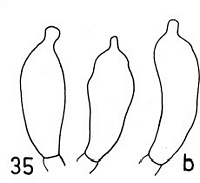
Caption: 35-Hypholoma brunneum: b. chrysocystidia. | 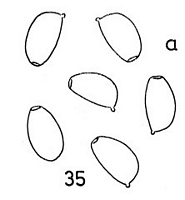
Caption: 35-Hypholoma brunneum: a. spores. | 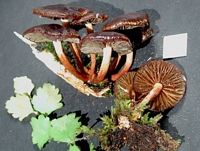
Owner: J.A. Cooper | 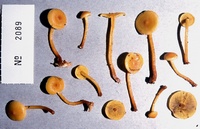
Caption: ZT2089
Owner: E. Horak: © Creative Commons Attribution-Noncommercial 3.0 New Zealand | 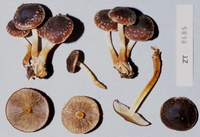
Caption: ZT8685
Owner: E. Horak: © Creative Commons Attribution-Noncommercial 3.0 New Zealand | 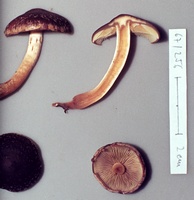
Caption: ZT67-256
Owner: E. Horak: © Creative Commons Attribution-Noncommercial 3.0 New Zealand | 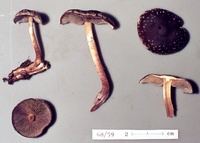
Caption: ZT68-059
Owner: E. Horak: © Creative Commons Attribution-Noncommercial 3.0 New Zealand | 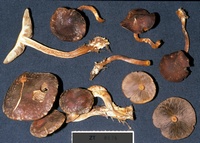
Caption: ZT8676
Owner: E. Horak: © Creative Commons Attribution-Noncommercial 3.0 New Zealand | 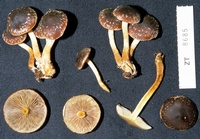
Caption: ZT8685
Owner: E. Horak: © Creative Commons Attribution-Noncommercial 3.0 New Zealand | 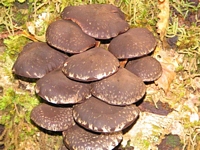
Caption: Wangapeka area, 2006
Owner: Colin Duncan | 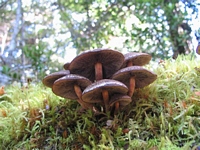
Caption: Wangapeka area, 2006
Owner: Colin Colmar | 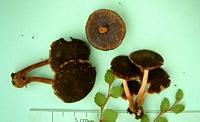
Caption: Kaimanawa Mountains, Taupo, North Island, 2001-05-01
Owner: Karl Soop | |
Article: Reid, D.A. (1956) [1955]. New or interesting records of Australasian basidiomycetes. Kew Bulletin 1955: 631-648.
Description: Pileus 4-5 cm. or more in diameter, dark olive brown to nearly black when fresh, smooth
above, plane, but margin occasionally inrolled. Stipe up to 6 cm. in length, hollow, glabrous,
concolorous with cap. Flesh very thin, silky, fibrous, ochraceous, drying yellowish,
homogeneous with that of stipe. Gills adnate, interlaminated, 0-5 cm. wide, olive-tinted
cinnamon, dusky. Pleurocystidia present, 25-32 x 11-12 µ, clavate, with brown contents.
Spores brown under the microscope, elliptical, monoguttulate, with well defined apical germ-pores, 6
-7.5 x 3.5-4 µ (7-8 x 4-4.5 µ in the type collection).
Notes: This fungus which is a problem to nurserymen in Tasmania, was hitherto known only from
New Zealand.
Article: Massee, G.E. (1899) [1898]. The fungus flora of New Zealand. Transactions and Proceedings of the New Zealand Institute 31: 282–349 Wellington:.
Description: Pileus subglobose, then expanding until almost plane, margin usually drooping, slightly
umbonate, sometimes depressed round the umbo, 1-3 cm, across, even, glabrous, uniform
dark-brown; flesh thin, pale greenish-yellow; gills adnexed, becoming almost or quite free as
the pileus expands, crowded, rather broad, rusty-brown at maturity; spores elliptical, 5 x 3 µ,
rusty; stem 3-7 cm. long, slender, almost equal, paler than the pileus, almost or quite smooth.
Habitat: On logs.
Distribution: New Zealand.
Notes: Sent to Kew by Colenso mixed with F. purpureo-nitens, from which it differs, as also from
every other described species, by the dark-brown pileus and greenish-yellow flesh.
Fasciculate.
Article: Horak, E. (1971). A contribution towards the revision of the Agaricales (Fungi) from New Zealand. New Zealand Journal of Botany 9(3): 403-462 (http://www.rsnz.org/publish/abstracts.php).
Notes: Flammula brunnea Massee (16,D) Figs 2, 3 = Hypholoma brunneum (Massee)
Reid 1955=. Type material: COLENSO b 668.
|